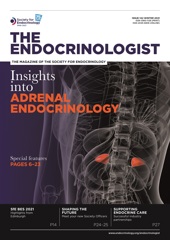
Anna Mitchell and Louise Walker
In endocrinology, we are acutely aware of the importance of steroid safety. Keeping our steroid-dependent patients safe and well is an important part of our day-to-day work and, in general, we all feel like we are pretty good at it. But we need to think beyond our own discipline.
For the Endocrinology Team in Newcastle upon Tyne, steroid safety is something of an obsession. We use a ‘pop-up’ electronic record alert for all steroid-dependent patients who attend endocrine outpatient clinics, and we register them as being steroid-dependent with their local ambulance trust. We aim to empower our steroid-dependent patients to manage their medications independently, to allow them to remain in control of their health and well-being.
The endocrine nurse specialists have a particularly important role to play here, in educating patients and anyone else who is interested. We offer intense support around the time of diagnosis and a ‘little and often’ approach thereafter, tailored to the patient’s needs and wants. We usually start with a one-to-one training session, to go over steroid sick day rules in detail and how to administer an i.m. hydrocortisone injection in an emergency, and then follow-up refresher sessions. We regularly check that patients have a steroid card and an up-to-date injection kit, and we have also run successful group steroid education sessions. Our experience is that support is generally welcomed, and our patients know that we are just a phone call away to support them.

The new steroid safety card front (top) and back
In August 2020, a National Patient Safety Alert (NPSA) was issued, with the aim of implementing a universal steroid emergency card to support early recognition and treatment of adrenal crisis in adults. In Newcastle, this prompted us to put together a ‘steroid safety pack’, containing the new steroid emergency card (pictured) and an information leaflet about steroid sick day rules. This was posted out to each of our steroid-dependent endocrine clinic patients. Within weeks of the alert being issued, our patients were sorted (and we felt a little bit smug about it).
BEYOND ENDOCRINOLOGY
However, before the steroid safety packs had even landed on people’s doormats, we reflected, as a team, upon the vast majority of people taking steroids who are at risk of adrenal insufficiency and adrenal crisis and who are not being seen in endocrinology clinics. For example, they are being seen by:
- GPs who prescribe long courses of prednisolone for polymyalgia rheumatica
- nephrologists who prescribe long term steroids for renal transplant recipients
- rheumatologists who administer regular intra-articular steroids for inflammatory arthropathies, and
- respiratory doctors who prescribe potent inhaled steroids in combination with short, repeated courses of prednisolone in chronic obstructive pulmonary disease.
Regardless of their underlying diagnosis or the managing team, it is a crucial safety measure to ensure that patients who receive exogenous steroids and are at risk of adrenal suppression are identified and given appropriate and consistent steroid safety advice. As endocrinologists, we are ideally placed to support our colleagues in implementing the NPSA widely, to bring steroid safety to the masses.

The old steroid treatment card
A CATALYST FOR CHANGE
The NPSA has shone a spotlight on the wider issue of steroid safety as a concern for ALL steroid-dependent patients, not just the ones attending endocrinology clinics. It represented, and still represents, an opportunity to share our steroid safety expertise widely.
In Newcastle, the NPSA has been a real catalyst for change and service improvement. We have used it to start conversations with colleagues in other specialties, about their approaches to identifying people on exogenous steroids who are at risk of adrenal insufficiency. It has given us the chance to ask colleagues about the education they offer steroid-dependent patients (in addition to ensuring that they are all given a steroid emergency card).
These conversations have led to each specialty identifying a ‘Steroid Lead’ to champion steroid safety. When the Steroid Leads met (virtually, thanks to COVID), it was obvious that many of the challenges that people encounter when managing steroid-dependent patients are universal and not specialty-specific. So, on the back of the NPSA, we have created shared pathways, for example for safe steroid withdrawal, and shared resources, including generic sick day rules patient information leaflets, and a quick reference guide for managing acutely unwell steroid-dependent adults in hospital. This should lead to consistent, high quality care for steroid-dependent patients, regardless of who is managing them.
A TOOL FOR ENGAGEMENT
The NPSA has also been an excellent tool in engaging pharmacists in helping to identify patients who should be considered steroid-dependent. This helps ensure that they are given steroid emergency cards and sick day rules information with prescribed steroids. It has also acted as a focus for numerous education sessions on recognising adrenal crisis and managing it.
The NPSA has set in motion some very positive changes, and started some important conversations. We must capitalise upon the momentum gathered, to continue to keep steroid safety at the forefront of all clinicians’ minds.
Steroid safety is not the sole preserve of endocrinologists. If we just talk to each other about steroid safety, then we are preaching to the choir. We need to break out of our echo chamber and actively engage our colleagues in recognising people who are at risk of adrenal insufficiency. In this way, we can support them in improving the safety of those patients, regardless of the clinic that they are attending.
ANNA MITCHELL AND LOUISE WALKER
Consultant Endocrinologist and Endocrine Nurse Specialist,
Newcastle upon Tyne Hospitals NHS Foundation Trust








